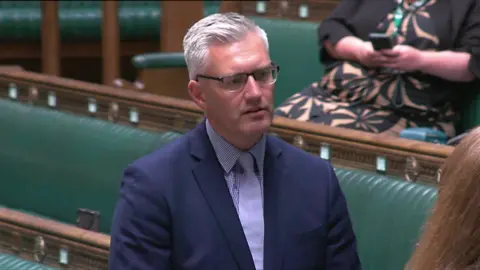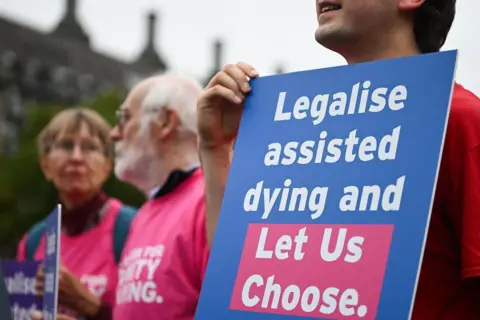MP to vote against assisted dying bill
 BBC
BBCA Labour MP says he will vote against plans to legalise assisted dying over fears people could be coerced into ending their life.
North Northumberland's David Smith told the BBC's Politics North programme there was "simply not enough time" to consider the issue in detail.
The proposed law would allow some terminally ill people in England and Wales to have a medically assisted death. A separate bill is under discussion in Scotland.
Parliament will debate the bill on Friday.
MPs will get a free vote on Friday, meaning they can follow their conscience rather than party orders.
Smith, who was elected in July, said: "We were given a 40-page bill three weeks ago and we've got five hours next Friday to debate it. That's simply not enough time.
"The second reason is principle. That's about the fear of coercion. I've spoken to doctors who've said it's almost impossible to see coercion happening, even from loved ones.
"The worst thing for me is the pressure people might put on themselves, feeling they're a burden.
"For those reasons I'll be voting against it."
Fellow guest Chloe Reilly, of the North Tyneside Green Party, said people "should have the right to die with dignity" but warned the NHS would not be able to cope with a change in the law given its current difficulties.
"I've got to agree with David. It just isn't the right time for the NHS.
"It's so overstretched. We can't possibly get to it while we don't have palliative care in the right place."
'Safeguards' needed
The latest YouGov poll recorded 73% of Britons in support of allowing assisted dying in principle.
Natalie Younes, of Northumberland's Liberal Democrats, said politicians "need to listen to people and respect their wishes".
"We need to put better safeguards in place, invest money, have a proper procedure and manage it properly.
"That doesn't mean we shouldn't do it."
The bill says anyone who wants to end their life must:
- be over 18 and live in England and Wales, and have been registered with a GP for at least 12 months
- have the mental capacity to make the choice and be deemed to have expressed a clear, settled and informed wish, free from coercion or pressure
- be expected to die within six months
- make two separate declarations, witnessed and signed, about their wish to die
- satisfy two independent doctors that they are eligible - with at least seven days between each doctor's assessment
A High Court judge must hear from at least one of the doctors, and can question the dying person or anyone else considered relevant.
After the judge has made their ruling, a patient would have to wait another 14 days before acting.
A doctor would prepare the substance being used to end the patient's life, but the person would take it themselves.
It would be illegal to pressure or coerce someone into declaring they want to end their life, carrying a possible 14-year prison sentence.
 Getty Images
Getty ImagesEarlier on Sunday, Work and Pensions Secretary Liz Kendall told the BBC the bill was about the "right to choose".
Her comments came as 29 faith leaders representing signed an open letter warning the Terminally Ill Adults (End of Life) Bill would lead to people being pressured into ending their lives.
Both the British Medical Association, which represents doctors, and the Royal College of Nursing have neutral positions on assisted dying.
Follow BBC North East on X, Facebook, Nextdoor and Instagram. Send your story ideas to [email protected].
